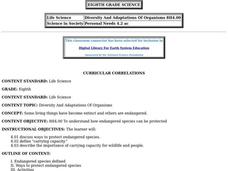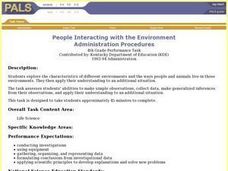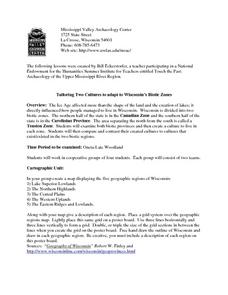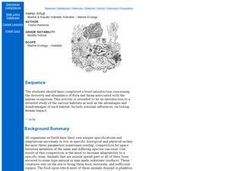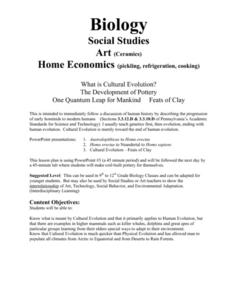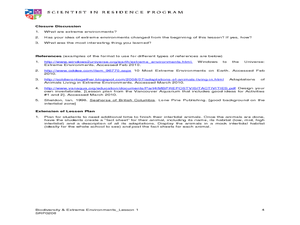Institute of Electrical and Electronics Engineers
Interactive Gumball Machine
Sure, you may be able to build a better mousetrap, but what about a gum dispenser? In a fun engineering challenge, teams must design and build a working interactive gumball machine with specific constraints and criteria.
NASA
Einstein's Gravity
Assist your high school class with researching and applying the principles of gravity so they may further understand why Einstein is so widely recognized, even today. Individuals compare and contrast two different models that demonstrate...
Carolina K-12
Exploring the Electoral College
Does your vote really count? This activity helps young voters learn about the electoral college through a TED talk, a helpful handout, discussion prompts, and then a role-playing activity that has participants simulating an election on a...
National History Day
Propaganda Posters of World War I: Analyzing the Methods Behind the Images
The power of a picture. During the events surrounding World War I, propaganda posters were widely distributed in American society to sway the emotions of its citizens. By analyzing World War I propaganda posters in the first installment...
Curated OER
Diversity and Adaptations of Organisms
Eighth graders discuss ways in which to protect endangered species. They examine the concept of carrying capacity. They discuss the importance of carrying capacity for wildlife and people.
Curated OER
Diversity and Adaptations of Organisms
Eighth graders discover the difference between extinct and endangered animals and discuss the reasons why this has occured. They identify threatened and endangered animals living in their local area as well.
Curated OER
People Interacting with the Environment
Students explore an arctic, temperate, and tropical environment and then decide what people need in each environment to help them live comfortably and what their lives would be like.
Curated OER
Science: Why Animals Hibernate
Second graders investigate the reasons animals hibernate. They measure their own heart rates and compare them to those of a hibernating bear. In their journals, 2nd graders record facts about and characteristics of hibernation and...
Curated OER
Tailoring Two Cultures to Adapt to Wisconsin's Biotic Zones
Students examine the effect of the various ice ages on Wisconsin. In groups, they create a map representing the five geographic regions of Wisconsin. They must write out a description of each region to be placed on a poster board. ...
Curated OER
Discovering Owls
Students are introduced to different types of owls and owl pellets. They list several adaptations that benefit the owls. Students identify the various species of owl that live in Wisconsin. Students discuss owl pellets and identify the...
Curated OER
Winter
Students examine how animals adapt to the harsh New England winter. They discuss articles they have read on the subject.
Curated OER
Learning Cycle Lesson Plan #6 (Misconception)
Ninth graders investigate evolution via natural selection and form an opinion. They support their opinion using scientific evidence and apply this to adaptations that have allowed certain organisms to survive.
Curated OER
Why Should I Care About Global Warming?
Students examine global warming, and the greenhouse effect. They determine the changes that happen and the adaptations that need to be made because of these occurrences. They look at the occurrence and effect of these phenomena in the past.
Curated OER
Activity: Bird Beak Buffet
Students study the functions of bird beaks. In this animal evolution lesson, students compare and contrast different types of bird beaks focusing on how the beaks are adapted to the foods the birds eat. Students record and graph their...
Curated OER
Seeing the World Through A Different Lens
Students participate in activities in which they model different disabilities. They discuss their experiences as a class. They work together in groups to discuss how to improve an adaptive device.
Curated OER
Marine & Aquatic Habitats Activities - Marine Ecology
Students enact the life cycle of a sessile animal and quantify the possibility of survival under the conditions given. They then present to the class a new adaptation which will increase the animals chance of survival.
Curated OER
What is Cultural Evolution?
Students comprehend what is meant by Cultural Evolution and that it primarily applies at Human Evolution, but that there are examples in higher mammals such as a killer whales, dolphins and great apes of particular groups by exploring...
Curated OER
Twisted Vision
Learners investigate the vision adaptations in marine animals in their environments. In this life science instructional activity, students use polarized filters and make observations. Learners explain how the adaptation of polarized...
Curated OER
Extreme Environments
Students examine extreme environments and the characteristics that make them. In this adaptation lesson students see how animals have adapted to these environments.
Curated OER
Weather in the USA
Students identify the different types of weather conditions that occur in the United States. They discover how to adapt to weather and explain forecast and warning signals.
Curated OER
Plants
Third graders study the factors necessary for plant growth and how plants adapt to their environment. They examine ow different plants require different environments to thrive.
Curated OER
Human Needs
Young scholars investigate human needs and how they have adapted to different environments. They complete an experiment to discover the effect of stress on muscles. They use the food pyramid to create a plan for healthy eating.
Curated OER
Nitrogen Fixation, OR What a Gas!
Students illustrate the adaptation and co-evolution of organisms. They examine set up an experiment to determine the effect of adding the Rhizobium bacteria to a group of legume seeds.
Curated OER
Habitat
Students are able to define habitat. They are able to identify the four things that living things need to survive. Students are able to describe how living things are adapted to their habitats.
Other popular searches
- Animal Adaptations
- Ocean Animal Adaptations
- Bird Beak Adaptation
- Plant Adaptations
- Behavioral Adaptations
- Adaptation and Evolution
- Bird Adaptations
- Insect Adaptations
- Plant and Animal Adaptation
- Fantasy Animal Adaptations
- Fish Adaptations
- Adaptation Habitat






